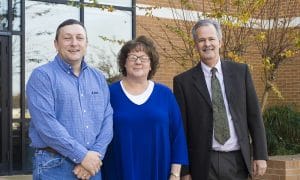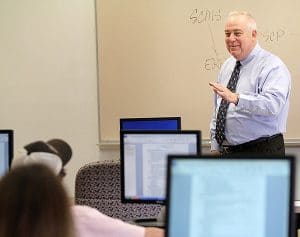 Providing students at Southern Arkansas University with cutting-edge knowledge of systems that bring products from suppliers to store shelves – and the fingertips of consumers – is the aim of the new undergraduate degree emphasis in Supply Chain Management, said Dr. Kenneth Green, the LeMay Professor of Management in the Rankin College of Business.
Providing students at Southern Arkansas University with cutting-edge knowledge of systems that bring products from suppliers to store shelves – and the fingertips of consumers – is the aim of the new undergraduate degree emphasis in Supply Chain Management, said Dr. Kenneth Green, the LeMay Professor of Management in the Rankin College of Business.
“We graduated our first majors in the program last spring,” he said, “and we will have more to graduate this year. This major will give our graduates a definite advantage in the workplace.”
“The addition of the Supply Chain Management degree demonstrates how the Rankin College of Business is consistently reviewing programs and updating our curriculum to respond to the changing business environment,” Dr. Robin Sronce, Dean of the David F. Rankin College of Business, said.
Green defined Supply Chain Management as the “integration and coordination of business processes … for the purposes of satisfying the final customers.” These processes include purchasing, manufacturing, marketing, logistics and information systems. Technology has made it possible for suppliers to see into inventories at different stores and for vendors to manage inventory. It shortens the amount of time to satisfy the customer.
“Vendors want to know when you pick up a box from a store shelf,” Green said. “This has changed the way we teach business. It’s no longer a top-down model within a single plant, but spread out along a value chain that extends from the supplier to the ultimate customer. Supply Chain Management is built on the ability to communicate information to partners along the chain. It is all one network.”
He said SCM theories “began to emerge in the early 1980s, with Walmart and Dell offering successful early examples of these strategies. It is the goal of our program to provide graduates with the skills and knowledge necessary to support organizational efforts to successfully implement these strategies.”
Students are exposed to the following areas: supply chain management strategy, enterprise resource planning systems, RFID technology applications, environmental sustainability supply chain practices, and project management.

Green said local industries asked SAU to begin emphasizing SCM, which he now teaches along with Ronnie Watson. “When it came time to develop the program, we did so based on 15 years of research that I had developed along with Dr. James Clark, Dr. Lisa Toms, Vikram Bhadauria, and Dr. Jeremy Meacham.”
He said SAU Administration has been extremely supportive of the development and implementation of the program.
SAU also offers an MBA with Supply Chain Management emphasis. Recent graduates from SAU, such as Glenn Muffih, are putting their business education to use. Muffih, a 2015 alum, uses his Supply Chain Management knowledge in Cameroon, his home country on the west coast of Africa, where he is the program Supply Chain Officer with the eMTCT project (Elimination of Mother to Child Transmission of HIV) with the Clinton Health Access Initiative. “I was able to have attained a firm foundation on Supply Chain Management from SAU,” Muffih said. “The projects and cases we did in SAU’s MBA program have really helped prepare me for the real world. My job is to ensure that pregnant women and children in Cameroon living with HIV have a continuous supply of HIV commodities.”
Graduates who have completed coursework in Supply Chain Management have experienced lucrative job opportunities. Forbes reports that the U.S. logistics business employs around 6 million people, and in 2018 will look to employ about 1.4 million SCM jobs. As Muffih’s case shows, these skills are in demand globally.
The program is fully accredited by AACSB International, the premier accrediting body for colleges and schools of business. Fewer than five percent of all business programs worldwide are accredited by AACSB, indicating the quality of the Rankin College of Business at SAU.
